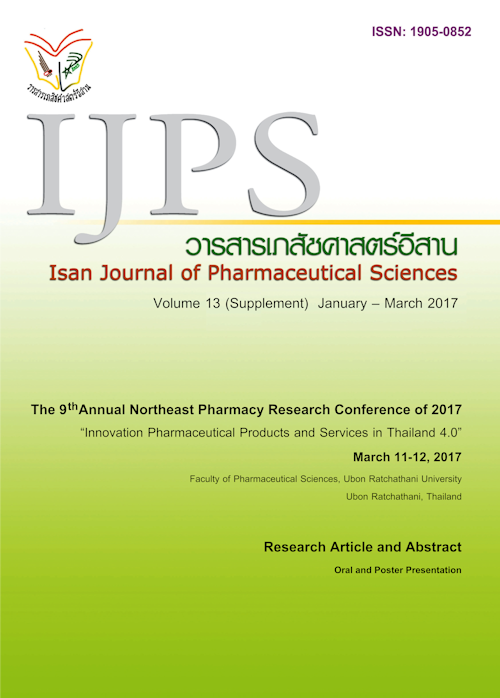Fatty Acid Compositions and Physicochemical Properties of Chinese Soft-shelled Turtle Oil (Trionyx sinensis japonicus)
Main Article Content
Abstract
Introduction: Recently, Chinese soft-shelled turtle oil (Trionyx sinensis japonicus) is a highly popular product for food and traditional medicine. However, there is still limited information about the compositions of Chinese soft-shelled turtle oil. Thus, the aim of this study is to analyze the fatty acid compositions and physicochemical properties of Chinese soft-shelled turtle oil. Methods: The fatty acid compositions and cholesterol of Chinese soft-shelled turtle oil extracted by microwave in two lots were characterized and determined by gas chromatography. The physicochemical properties e.g. saponification value, unsaponifiable matter and moisture were analyzed according to AOAC Official method. The specific gravity, color, melting point, reflective index and infrared spectrum were also determined. Results: The physicochemical properties and fatty acid compositions were determined. Total saturated fatty acid were 31.11 and 28.95 g/100 g oil in lot 1 and 2, respectively with palmitic acid as the major component. Total monounsaturated fatty acid (MUFA) in lot 1 and 2 were 50.54 and 52.61 g/100 g oil, respectively with oleic acid as the major component. Total polyunsaturated fatty acid (PUFA) were 18.08 and 12.66 g/100 g oil in lot 1 and 2, respectively. In addition, Eicosapentaenoic acid (EPA) and Docosahexaenoic acid (DHA) were also found. Conclusion: The determination of fatty acid compositions and physicochemical properties of soft-shelled turtle oil revealed that the oil was compose of saturated fatty acid, MUFA, PUFA and also cholesterol.
Article Details
In the case that some parts are used by others The author must Confirm that obtaining permission to use some of the original authors. And must attach evidence That the permission has been included
References
AOAC. Official methods of analysis of the Associaion of Official Analytical Chemists, 2012. 18th ed. AOAC. Inc., Arlington, VA.
Daozun W, Zhengrong T, Yujun T. Biochemical Compositions of Chinese Soft-Shelled Turtle (Trionyx Sinensis) I. Contents of normal nutrients and composition of muscle fatty acids. Acta Hydrobiol Sin. 1997, 4: 001.
De Pedro E, Casillas M, Miranda CM. Microwave oven application in the extraction of fat from the subcutaneous tissue of Iberian pig ham. Meat Sci. 1997, 45(1): 45-51.
Huang C-H, Lin W-Y, Chu J-H. Dietary lipid level influences fatty acid profiles, tissue composition, and lipid peroxidation of soft-shelled turtle, Pelodiscus sinensis. Comp Biochem Physiol A Mol Integr Physiol. 2005, 142(3): 383-388.
Huanling Y, Yong L, Junbo W, Liping Z, Weixing Y. Chinese soft-shelled turtle egg powder lowers serum cholesterol, increases faecal neutral steroids and bile acid excretion, and up-regulates liver cytochrome P450 mRNA level in rats. Br J Nutr. 2005, 94(03): 315-320.
Huiqin W, Guiying Z, Zhiqing C. Study on Composition of Fatty Acids in Soft shelled Turtle Oil. J Instrum Anal. 1997, 2.
Li JF, Chen BH, Lu YF. Positional characteristics of triacylglycerol in soft-shelled turtle oil and its effects on lipid metabolism in hamsters fed a high fat diet. Food Chem. 2007, 100(2): 781-787.
Lin W-Y, Huang C-H. Fatty acid composition and lipid peroxidation of soft-shelled turtle, Pelodiscus sinensis, fed different dietary lipid sources. Comp Biochem Physiol C Pharmacol Toxicol Endocrinol. 2007, 144(4): 327-233.
Yin J, Tezuka Y, Subehan, Shi L, Ueda J-y, Matsushige K, et al. A Combination of Soft-Shell Turtle Powder and Essential Oil of a Unicellular Chorophyte Prevents Bone Loss and Decreased Bone Strength in Ovariectomized Rats. Biol Pharm Bull. 2005, 28(2): 275-279.


